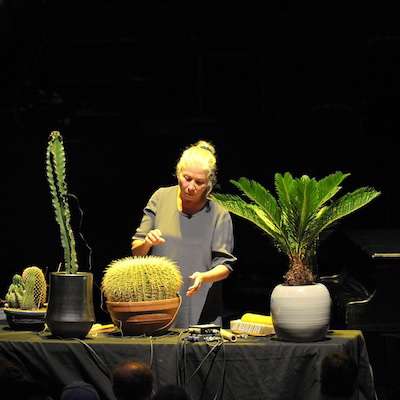|
Back
A Centenary Cage-athon London
Royal Albert Hall
08/17/2012 -
John Cage: 1O1 – Improvisation III – Experiences II – ear for EAR (Antiphonies) – Four2 – Cartridge Music and Atlas Eclipticalis with Winter Music; Concerto for Prepared Piano and Chamber Orchestra – But what about the noise of crumpling paper... – Branches
Christian Marclay: Baggage
David Behrman, Takehisa Kosugi, Keith Rowe & Christian Wolff: Quartet
Joan La Barbara (vocalist), John Tilbury (piano/prepared piano), Frank Denyer, Aki Takahashi, Christian Wolff (pianos), David Behrman, Takehisa Kosugi (live electronics), Keith Rowe (guitar/live electronics), Vicki Bennett, Steve Beresford, Adam Bohman, Jonathan Bohman, Karen Constance, Christoph Heemann, Dylan Nyoukis, Mariam Rezaei (cassette players), John Butcher, Angharad Davies, Rhodri Davies, Patrick Farmer, Ram Gabay, Lina Lapelyte, Dimitra Lazaridou-Chatzigoga, John Lely, Anton Lukoszevieze, Christian Marclay, Robyn Schulkowsky (instrumentalists), Exaudi, James Weeks (chorus-master)
BBC Scottish Symphony Orchestra,
Ilan Volkov (conductor)

(© Chris Christodoulou)
Perhaps it’s something to do with the Olympics? While there are avid lifelong fans of each one of the less-frequently-televised events featured, there have also been legions of people who usually barely register an interest in sport glued to Greco-Roman wrestling, the incomprehensible varieties of bicycle race, and hours of athletes repeatedly flinging different objects across a field. Likewise, although the many ardent fans of John Cage were obviously out in force for this centenary celebration concert for the legendary iconoclast, also present were a significant number of newcomers both to the ‘genre’ (if it can be called such) and to the Proms themselves. And the majority of them stayed the distance, too – a not inconsiderable 3 1/2hours (five if one took the Cage-inspired ‘Music Walk’ beforehand), at least an hour of which involved seemingly-abstract soundscapes created from unpitched ‘found’ instruments such as paper, wires, an electric fan, an vast range of cacti (Branches), and the Scottish Symphony Orchestra’s instrument cases (the Marclay piece Baggage).
Of course, the sound made by rustling paper is not very loud (unless it is a nearby audience member’s programme, in which case it is obviously infuriatingly so), so amplification was a major feature of the concert. This is something the Royal Albert Hall can now do very well, and the use of multiple speaker systems placed around the hall and on different levels – as, in fact, were the performers in most pieces – created a complex 3-dimensional auditory experience. Cage’s performance instructions do often dictate spatial separation of performers, but rarely is it possible to arrange them in patterns to the extent afforded by these surroundings, with spatial geometry a counterpart to the geometric forms of Cage’s compositional structures. This concept was used to great effect in Cartridge Music / Atlas eclipticalis / Winter Music (performed simultaneously), with the audio feeds from different instruments being ‘thrown’ around the hall. While I confess I am not personally a great appreciator of pointillist composition (the auditory equivalent of being poked and prodded with a selection of sharp and blunt sticks), I nevertheless found the sonic architecture aspect fascinating.
The programme was chosen to showcase a wide variety of music from throughout Cage’s career, plus pieces by other composers influenced by him, and a review of this size cannot do justice to all of the thirteen works performed. I particularly enjoyed the first piece, 101 (1988), its Ligeti-ish orchestral textures feeling like a spritz of cooling mist on a too-hot day, and ear for EAR (1983), where Joan La Barbara’s deep, soulful solo voice (heard first in the modal, folky Experiences II) was joined by members of Exaudi singing microtonally-tinged echoes and variations from behind curtains in the Stalls doorways. Prepared piano veteran John Tilbury’s performance in the concerto was another highlight. I also found Improvisation II especially interesting; written by Cage in order to overcome his aversion to improvisation in music (with its ‘self-indulgent’ displays of performers’ personalities), performers ‘play’ cassette players and improvise by choosing from a small library of tape samples – thus subverting their tendencies to overt self-expression. The piece is mostly marked pp, but each performer is allowed one crescendo, and the tactics of this – not knowing who was going to make their move when – gave it something of a sporting-spectator feel.
The dynamics of the concert in general ranged from extremely quiet to moderate, and with generous use of silence between the sounds. After a great deal of time spent listening very carefully to catch all the small details, it was first rather startling and then a welcome change of direction when David Behrman, Takehisa Kosugi, Keith Rowe and Christian Wolff turned the volume up considerably for their own Quartet. Suddenly there were long extended tones reverberating round the hall, plays on harmonic spectra, and deliciously fat thumping wedges of analogue electronic noise. This kind of retro electronica, controlled live with wires and dials rather than programmed into a computer, is, in my opinion, an important part of our musical history not heard often enough in the concert hall.
For those interested in hearing more John Cage, BBC Radio 3 are continuing their celebration of the composer in a series of programmes in September. The Music Walk consists of short pieces by 10 contemporary composers, written in response to a series of specific locations in and around the Royal Albert Hall, culminating in Judith Weir’s What’s in the Lake?, to be listened to at the Serpentine Gallery Pavilion. They are free to download from the BBC Proms’ website until the end of the season.
Carla Finesilver
|